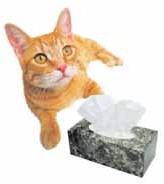

Cat Respiratory Disorders, Symptoms & Treatments
With cats, problems may occur anywhere in the respiratory system, from a nose tickle producing a sneeze, to trauma in the chest causing labored breathing and shock. Infections are usually restricted to either the upper or lower respiratory systems, but calicivirus flu infection may lead to secondary pneumonia, especially in kittens. Virtually all conditions of the respiratory system cause sneezing, a nasal discharge, or changes in your cat's regular breathing pattern.
When Your Cat Sneezes:
The most common cause of sneezing, with or without nasal discharge, is one of the cat flu viruses. Cat flu affects between 13 and 20 per cent of all cats. Allergy and environmental irritation are other common causes. Although respiratory tract tumors are rare, when they do occur, about 75 per cent of them are in the nose and cause sneezing. Cat with some white skin or hair are 13 times more likely to develop nasal tumors than other cats. Intense sneezing may lead to a nosebleed. If sneezing is accompanied by any type of discharge, see your vet within 24 hours.
The most common cause of sneezing, with or without nasal discharge, is one of the cat flu viruses. Cat flu affects between 13 and 20 per cent of all cats. Allergy and environmental irritation are other common causes. Although respiratory tract tumors are rare, when they do occur, about 75 per cent of them are in the nose and cause sneezing. Cat with some white skin or hair are 13 times more likely to develop nasal tumors than other cats. Intense sneezing may lead to a nosebleed. If sneezing is accompanied by any type of discharge, see your vet within 24 hours.
*Cat Flu: This is caused by one of three different viruses or a mycobacterium called chlamydia. Reovirus usually causes only mild eye inflammation, while chlamydia causes serious eye inflammation that responds well to a two week treatment of antibiotics.
*Sinusitis: Secondary bacterial or fungal infection to the sinuses can follow an episode of untreated viral cat flu. The discharge triggers paroxysms of sneezing accompanied by copious amounts of green-yellow material. An unusual form of Sinusitis is caused by cryptococcus, a fungus found in bird droppings. Sometimes called "pigeon breeders lung", cryptococcus is a serious health risk to immune-compromised individuals. Sinusitis is difficult to control even with long term anti-biotic therapy.
*Sinusitis: Secondary bacterial or fungal infection to the sinuses can follow an episode of untreated viral cat flu. The discharge triggers paroxysms of sneezing accompanied by copious amounts of green-yellow material. An unusual form of Sinusitis is caused by cryptococcus, a fungus found in bird droppings. Sometimes called "pigeon breeders lung", cryptococcus is a serious health risk to immune-compromised individuals. Sinusitis is difficult to control even with long term anti-biotic therapy.
Coughing In Cats:
Moist, productive coughing is rare in cats, whose cough is usually dry and nonproductive. It may be caused by allergy, pollution, infection, or foreign material in the air passages, but also by fluid in the chest cavity or airways, lung disease or injury, tumors, or parasites. If your cat's cough lasts more than a day, or if it recurs, contact your vet for advice.
Moist, productive coughing is rare in cats, whose cough is usually dry and nonproductive. It may be caused by allergy, pollution, infection, or foreign material in the air passages, but also by fluid in the chest cavity or airways, lung disease or injury, tumors, or parasites. If your cat's cough lasts more than a day, or if it recurs, contact your vet for advice.
Breathing Problems In Cats:
A breathing problem in your cat may be caused by a physical obstruction, chest injury, pneumonia, tumor, trauma, heart failure, poisoning, allergic reaction, pain, smoke inhalation, heatstroke, collapsed lung, or torn diaphragm. Changes in your cat's regular breathing pattern may also be caused by fear, pain, and shock. Breathing problems associated with fluid build-up in the chest or abdomen can develop insidiously. Fluid accumulates because of injury, heart or liver disease, or potentially lethal viral infection.
*Rapid, Shallow Breathing: Cats tend to breath fast after exercise, but also because of shock, poisoning, heatstroke, or pain. Contact your vet immediately if your cat's breathing rate has suddenly increased without any strenuous exercise.
*Labored Breathing: Difficult, labored breathing is always a significant symptom and is usually accompanied by rapid breathing. Causes include heart or airway disease; fluid in the chest cavity; lung disease; trauma, such as a torn diaphragm; and tumors. See your vet the same day.
*Noisy Breathing: In a cat, noisy breathing is always a cause for concern. Causes include fluid in the lungs and obstructions affecting the upper repiratory tract, such as foreign bodies or tumors. Contact your vet the same day.
*Wheezing and Asthma: Wheezing is a sign of a lung problem, an inflammation to the air passages (bronchitis) usually associated with asthma. Asthma may cause mild coughing and open-mouthed breathing as well as wheezing. Sometimes asthma can develop quickly, causing acute repiratory distress. Treatment: The condition responds to corticosteroids. Bronchodilators are also used. If your cat is wheezing or showing signs of an asthmatic attack, see your vet immediately.
*Heatstroke: Cats are attracted to warm places. Always check your dryer before switching it on. Never leave your cat alone in your car in hot weather, or even in cold sunny weather with the car heater on. Treatment: If your cat has repiratory distress caused by heatstroke, put it in a sink or bath and run water over it, especially over its head, allowing water to fill the sink. Alternatively, place the cat in a pool of water or hose it thoroughly. A pack of frozen peas on the cat's head reduces heat to the brain. See your vet immediately.
A breathing problem in your cat may be caused by a physical obstruction, chest injury, pneumonia, tumor, trauma, heart failure, poisoning, allergic reaction, pain, smoke inhalation, heatstroke, collapsed lung, or torn diaphragm. Changes in your cat's regular breathing pattern may also be caused by fear, pain, and shock. Breathing problems associated with fluid build-up in the chest or abdomen can develop insidiously. Fluid accumulates because of injury, heart or liver disease, or potentially lethal viral infection.
*Rapid, Shallow Breathing: Cats tend to breath fast after exercise, but also because of shock, poisoning, heatstroke, or pain. Contact your vet immediately if your cat's breathing rate has suddenly increased without any strenuous exercise.
*Labored Breathing: Difficult, labored breathing is always a significant symptom and is usually accompanied by rapid breathing. Causes include heart or airway disease; fluid in the chest cavity; lung disease; trauma, such as a torn diaphragm; and tumors. See your vet the same day.
*Noisy Breathing: In a cat, noisy breathing is always a cause for concern. Causes include fluid in the lungs and obstructions affecting the upper repiratory tract, such as foreign bodies or tumors. Contact your vet the same day.
*Wheezing and Asthma: Wheezing is a sign of a lung problem, an inflammation to the air passages (bronchitis) usually associated with asthma. Asthma may cause mild coughing and open-mouthed breathing as well as wheezing. Sometimes asthma can develop quickly, causing acute repiratory distress. Treatment: The condition responds to corticosteroids. Bronchodilators are also used. If your cat is wheezing or showing signs of an asthmatic attack, see your vet immediately.
*Heatstroke: Cats are attracted to warm places. Always check your dryer before switching it on. Never leave your cat alone in your car in hot weather, or even in cold sunny weather with the car heater on. Treatment: If your cat has repiratory distress caused by heatstroke, put it in a sink or bath and run water over it, especially over its head, allowing water to fill the sink. Alternatively, place the cat in a pool of water or hose it thoroughly. A pack of frozen peas on the cat's head reduces heat to the brain. See your vet immediately.
Rhinitis: Inflammation of the nasal passages. Although commonly caused by allergy or irritation, Bordetella Bronchiseptica, the cause of canine kennel cough, is also a common cause of primary bacterial rhinitis in cats.
Bronchitis: Inflammation of the bronchi, the major air passages in the lungs.
Pleurisy or Pleuritis: Inflammation of the lining of the chest cavity.
Pulmonary Edema: Fluid buildup in the lungs.
Pleural Effusion: Fluid around the lungs.
Pyothorax: Pus in the chest cavity. This infection is acquired either from puncture wounds or via the bloodstream.
Pneumothorax: Air in the chest cavity around one or both collapsed lungs. Usually caused by trauma from bites, bullets, arrows, serious falls, or road-traffic accidents.
Chylothorax: A milky fluid in the chest cavity, compressing the lungs. Chylothorax has many causes.
Bronchitis: Inflammation of the bronchi, the major air passages in the lungs.
Pleurisy or Pleuritis: Inflammation of the lining of the chest cavity.
Pulmonary Edema: Fluid buildup in the lungs.
Pleural Effusion: Fluid around the lungs.
Pyothorax: Pus in the chest cavity. This infection is acquired either from puncture wounds or via the bloodstream.
Pneumothorax: Air in the chest cavity around one or both collapsed lungs. Usually caused by trauma from bites, bullets, arrows, serious falls, or road-traffic accidents.
Chylothorax: A milky fluid in the chest cavity, compressing the lungs. Chylothorax has many causes.
Cat Respiratory Disorders At A Glance:


Pet Meds: Dogs | Pet Meds: Cats | Dog Health : By Breed | Cat Health : By Breed | Dog Grooming | Cat Grooming | Pet Top 10's | Pet Food Recipes
Pet Meds: Dogs Pet Meds: Cats Common Dog Health Issues Common Cat Health Issues Dog Grooming Cat Grooming Pet Top 10's
Pet Health:Home
Copyright 2006-2011 PetMedsOnline.Org

Online Store For Cats!
Find everything from basic grooming items and tasty treats, to high tech devices designed for pets!
Find everything from basic grooming items and tasty treats, to high tech devices designed for pets!
Pet Top Lists!
From the friendliest cat breeds to the most intelligent dogs, you'll find it all on our "pet top list" pages!
From the friendliest cat breeds to the most intelligent dogs, you'll find it all on our "pet top list" pages!


